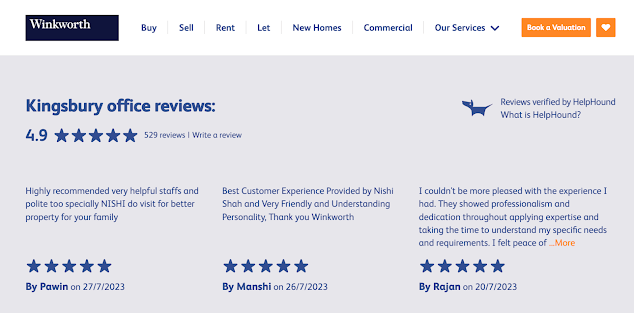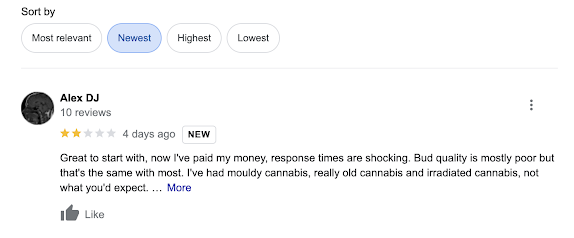Robin Bruce and John Williams have been joint CEOs of HelpHound for over ten years. In this interview, we ask them the questions most asked by prospective HelpHound members.
Q1. Online reviews have been around for the best part of twenty years now, what are the most important takeaways from your first-hand experience?
Robin: 'Three main things: first, businesses that commit to a proper reviews strategy unarguably win more business than those that don't. A great Google score and many Google reviews drive enquiries and clicks through search like nothing else.
Next: product reviews are not nearly as valuable - or as influential - as service reviews. Consumers actively seek out and read reviews of medical, financial and legal services (as well as other high-value services such as estate agency) whereas they just go by headline scores for a new TV or a pair of shoes. Interestingly, consumers will buy a product that scores 4 out of 5 on any platform but when it comes to essential services they will apply a far higher benchmark and actively seek out Google reviews. A minimum of 4.8 from at least 100 reviews has to be the first aim for every business in those sectors.'
John: Linkedin
John: 'I'm in charge of moderation [all HelpHound reviews are moderated pre-publication on the business's own site and before the reviewer is asked to copy their review to Google]. In the beginning, we thought businesses would appreciate moderation as a 'nice to have' add-on to our main service: allowing businesses to own and display their own reviews; as time went by we - and our clients - learned that moderation is a life-saver for businesses. One well-written negative review can stop the phones ringing. We have a file of case-histories where businesses have approached us after such a review has been written on a public platform, and how they wished they had been members before. We can 'rescue' a business from such a position, but far better for it not to occur in the first place. Our statistics show that giving customers - clients or patients - the ability to write a review to the business at a time of their own choosing results in far fewer inaccurate or misleading reviews being published on the business's own site or on Google.
Q2. How about review sites?
Robin: 'They're great for reinforcing sales of products. Consumers do respond to star ratings when making product purchases. The question I would pose to any business where service is key (as opposed to products they might sell) is 'Would you rather have a score of 4.8 on Google or on XYZ review site?' Experience has taught us that the answer - for an absolute fact - is Google. The only reason most service-oriented businesses have opted for a review site, as opposed to Google reviews, is that review sites have salesforces and Google - in terms of reviews - don't.'
John: 'Many review sites continue to over-promise on many levels. In a way they have been forced to since Google - with their unrivalled visbility - came to online reviews after the review sites did. They are fully aware that Google reviews show first in every search so they have to add value in other areas; the problem is that they seldom do. It is illegal to use a review site to filter out negative reviews before asking customers to post a review to Google but it is so common that the regulators have given it a name [Gating]. Some review sites insist that the reviewer support their review with documentary proof of purchase if challenged by the business or they allow the business to control the timing of the invitation to write the review [there's nothing wrong with the latter as long as the reviewer can also write a review when they wish]; both practices are illegal in the `UK and EU'. Some review sites even offer to promote paying members over other businesses, a practice that is legal in the USA but also illegal in the UK and EU.'
Q3. An outsider might have the impression that reviews are totally unregulated, is that not so?
John: the legal side is one of my main remits at HelpHound. Since the CMA [the UK regulator] wrote to businesses back in 2016 there have been very few cases of direct action against businesses flouting their regulations (which do have the full force of UK law). We have consistently advised non-compliant businesses that the main threat comes from competitors or ex-staff with an axe to grind who see (or know) that they are in breach. Competitors that see businesses in breach - and it is very easy to recognise those that are because, by definition, reviews leave a vivid paper trail - will simply use that fact against the business in question: 'Yes, XYZ do look very good, but then they would because [they cherry-pick/gate'].'
Step one: from here all good things review-related flow - moderated reviews shown on the business's own website; owned by the business, not by Google or a review site. Plus the overall score awarded by the business's customers and a click-through ('Write a review', top left next to the score and number of reviews) that allows anyone to write a review - ensuring full compliance with the CMA regulations.
Robin: 'We completely understand the temptation to flout the CMA regulations, given the power of positive reviews to drive business and the harm unfair negative reviews - even one - can do to a business. It's the main reason so many businesses either attempt to avoid engaging with reviews altogether or find themselves in breach. When we first speak or meet we are often told 'We had no option, we run a complex business in the [medical, legal, financial] field and if we obeyed the CMA's core rules - no cherry-picking and no gating - and allowed all of our [patients, clients] to post reviews our business would be put at severe risk'. It's why we introduced moderation and why moderation is so key to HelpHound adding value over and above simply inviting reviews direct to Google. Moderation is the AA of reviews - in the same way as no-one expects their car to break down but we all have motoring cover, when moderation does kick in it can be - often is - a lifesaver for the business.'
Q4. Can you put some numbers to moderation? What proportion of reviews need moderating?
John: First: we moderate every single review. They are read by a human being, not an algorithm (does 'hot' mean good or bad?). It's not the volume, it's the individual review itself. A business can have half a dozen or more 1* reviews that complain about 'the attitude of the receptionist' or 'the business's inability to answer the phone within X rings' and, although such reviews will impact the business's overall score, they won't, of themselves, deter a reasonable person from contacting that business.
But a single well-crafted but inaccurate or plain mistaken review that reads with credibility can - and will - do untold harm [here's just one example, where the judge awarded significant damages to the business for loss of earnings that the court had accepted were proven as a result of just one such review]. The interesting thing, in this context, is that very few authors of such reviews - containing factual inaccuracies or potentially misleading statements - respond negatively when contacted by one of our moderators.
If I had to give a short statistical answer to the question posed I would say that we see between one and three such reviews in every hundred; of those less than three percent choose - as is their right in law - to have their original review published after moderation (and always bear in mind: the business has a right to respond to such reviews, both on their own website and on Google).'
Q5. What are the biggest mistakes made by businesses regarding reviews?
Robin: There's quite a list...
- They use a review site when they would be far better served by using a moderated system such as HelpHound feeding through to Google reviews
- They break the law - often unintentionally ('ignorance is no defence' etc,)
- They don't fully integrate reviews throughout the business - and into their core CRM. You see this often - a flurry of reviews and then months when none are written
- They are sceptical that review management will add value in terms of their bottom line; it will - definitely!
- They copy what their competitors are doing when they could be trouncing them
- They don't understand the SEO impact of hosting reviews on their own site (it contributes roughly 15% of the total - just check any HelpHound client's position in local search)
John: I would simplify what Robin has just said: HelpHound, in terms of cost and disruption, is so negligible by comparison with its benefits for any business, especially those in the professions and services, that the Number 1 mistake has got to be 'Not trying/testing HelpHound.'
There's also the case of the client who thought that they would be just as well off inviting reviews direct to Google - until they fell victim to a such a damaging - and unfair - review that they dropped the Google review feed from their website altogether, thus going from HelpHound to Google to no reviews at all in a matter of months. When they came back to us we had to point out that changing their review mechanism as and when was a) probably placing them in breach of the CMA regulations and b) would be bound to be noticed by their competitors and used against them. Find a moderated system and stick with it.
Robin: In the early days, we marketed HelpHound as 'nice to have'. Because we had no hard numbers to back up our logic. That logic told us that a business with a great review score on its website and on Google would attract more customers than one that did not.
For some years now we have had the numbers - thanks, in part, to Google - Google reports increases/decreases in enquiry flows every month, direct to the business, so any uplift becomes rapidly apparent, and in part by some detailed competitive analysis done in an article on an estate agency industry forum that compared the results for two clients of ours against their main competitors.
From an outsider's perspective, it would, I'm sure you would agree, be hard to differentiate between London's two dominant agents - Winkworth has over 60 branches in London and Foxtons is not far off that number. Both invest heavily in presentation and marketing. Both have strong sales and lettings operations. But just pause a second and read the numbers here, put together by another agent. Without knowing, as we do, that Russell White, head of Winkworth's Putney office, majored in testimonial-driven sales before his branch became a client over five years ago, wouldn't you still be tempted to trial the only obvious differentiator: HelpHound membership?
John: As the person responsible for statistics within HelpHound I will put some numbers to Robin's comments: HelpHound clients report average uplifts in calls and clicks through Google between 15 and 25 percent. We have outlier clients that have reported in excess of 100% uplifts in the first 12 months of membership. And we obviously have clients who score near 5.0 with lots of Google reviews when they join that won't see such dramatic uplifts but value CMA compliance, the SEO kicker and moderation going forwards, as well as the facility to host their own reviews on their website and the maintenance of their competitive position. We have never had a client report a fall in such numbers.
There is more to effective review management than simple lead generation; quality of business is important as well, and the independent numbers support an uplift in that too. In this context the report that Robin is referring to above compared two very similar businesses - in estate agency - where our member had a sales inventory nearly twice as large as its competitor and a monetary value per transaction over 72 percent greater. Not only are they attracting more clients, each client is earning them significantly greater fee income.'
In many areas of business there are, as is illustrated here, so many more businesses competing for visibility in a Google search than Google can possibly cram into any kind of screen, be it desktop, laptop, tablet, or phone, and we all know that consumers will, all other factors - high score, many reviews - being equal, be drawn to those that dominate in search. There are upwards of twenty pins in this map, but just how many potential fee-payers will click through to one of the top three (by the way, that rich snippet 'Good service...' is drawn, by Google. straight from one of their reviews)?
John: The potential rewards a service business will derive from HelpHound membership so far outweigh the cost that a trial membership is a no-brainer.Robin: Surprise: I agree with John 100 percent. Come on in! I'd just like to add that, unlike many things one does in business, there's absolutely no downside risk whatsoever. The very worst that can happen is that you'll have a fully-CMA complaint review management system and a great extra CRM channel, plus an SEO boost. But if you see no uplift in enquiries or the quality of the business you attract just speak to one of us and I will bet my bottom dollar we can put that right for you (if you interrogate this blog - box top right - you'll see just how much more we do for our clients here at Helphound - we provide a Service with a capital 'S', not just software).














